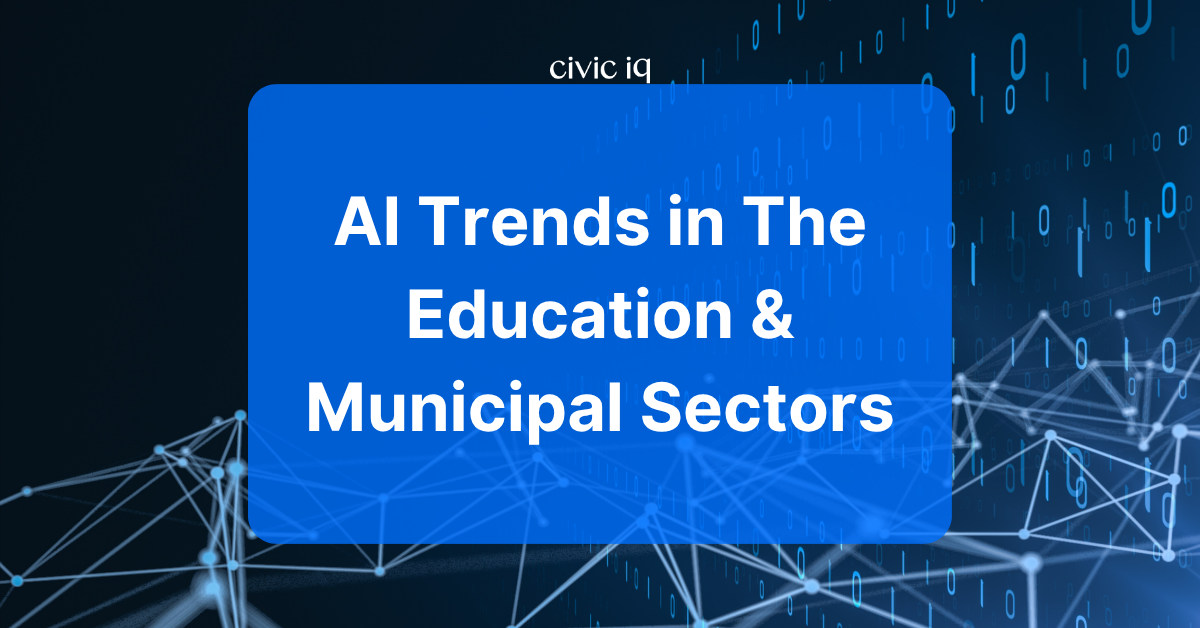
Unlock Massive Opportunities as AI Transforms the Municipal and Education Sectors
Artificial Intelligence (AI) is no longer a futuristic concept confined to Silicon Valley labs. It's rapidly transforming every facet of our lives, and perhaps nowhere is its impact more profound, yet less visible, than within our local governments and public institutions. From streamlining administrative tasks to revolutionizing education and enhancing public services, municipalities across the nation are actively exploring and integrating AI, creating an unprecedented wave of market opportunities for innovative businesses.
Based on recent municipal meeting transcripts and agendas, a clear picture emerges: the municipal sector is moving beyond theoretical discussions to concrete policy development, pilot programs, and strategic AI integrations. For businesses ready to innovate and partner, the time to engage is now.
Market Opportunities and Key Trends
The data unequivocally points to a burgeoning market for AI solutions within the municipal landscape, driven by a desire for efficiency, enhanced service delivery, and preparing the next generation for an AI-driven world.
1. Educational Transformation: The Epicenter of AI Adoption
The education sector, from K-12 school districts to higher education institutions, is leading the charge in municipal AI adoption. This isn't just about futuristic classrooms; it's about fundamental shifts in learning and administration.
- Policy & Governance: A significant trend is the proliferation of AI policies. School districts like Logansport Community School Corporation (IN) and David Douglas School District (OR) are not just discussing, but actively adopting comprehensive AI policies (e.g., Policy 7540.09, 815.1, EDEC, EFAC). These policies set guidelines for acceptable use, academic integrity, data privacy, and ethical considerations for both students and staff. This creates an immediate need for legal and IT consulting services specializing in AI policy development and compliance.
- AI for Instruction & Learning: AI is being embraced to directly enhance the learning experience. Williamsburg-James City County Public Schools (VA) is developing AI literacy programs, and Lisle CUSD 202 (IL) is leveraging AI for English Language Learners and writing improvement, even piloting Google Gemini. Districts like Plum Borough SD (PA) and Mount Vernon Community School Corporation (IN) are integrating AI platforms for blended learning. The approval of "AI Curriculum" (e.g., Uplift Michigan Academy) and dedicated "AI Innovators Certificate Degrees" (e.g., HorryGeorgetown Technical College) signals a deep commitment to AI education.
- Professional Development & Training: Recognizing the need to upskill educators, districts are heavily investing in AI training. Mendham Borough School District (NJ) and Pembroke Public Schools (ME)are allocating resources for staff AI literacy. Institutions like North Central Kansas Technical College (KS) are developing AI business training programs and hiring AI Project Managers, while Florida International University (FL) is piloting Microsoft CoPilot for productivity. This creates a strong demand for professional development providers and AI training platforms.
- New Roles & Strategic Focus: The emergence of dedicated roles like "AI Champion" (Achievement House CS, PA) and "Director of Research, Assessment and AI Integrations" (St. Cloud Public School District, MN) highlights the strategic importance of AI within school administration. These roles will drive future AI initiatives and procurement.
2. Operational Efficiency and Public Services
Beyond education, AI is being explored to optimize various municipal operations, promising cost savings and improved citizen services.
- Administrative Automation: Allegany County (NY) is implementing Typco Automated Systems' EVA AI for social services, including phone answering and staff assistance. The City of High Springs (FL) is looking to AI to boost staff efficiency and streamline municipal tasks under budget constraints. Lexington School District (MA) is already using AI for meeting transcriptions, demonstrating immediate practical applications.
- Smart City Initiatives: The City of Altamonte Springs (FL) is actively collaborating with tech giants like Microsoft, ESRI, and VHB to solve city-specific problems using next-gen AI. The City of Rensselaer (NY) is pursuing a DOT grant to use AI for traffic safety studies involving Commercial Motor Vehicles, showcasing AI's role in public safety and infrastructure.
- Data-Driven Decision Making: Municipalities aim to use AI to gain insights from vast datasets, as seen with Kootenai County (ID) updating its computer policy to include AI guidance for better data utilization. The City of Cudahy (CA) is even passing resolutions to ensure responsible and equitable AI advancement in municipal operations, highlighting a focus on ethical data practices.
Key Companies and Sectors Involved
The landscape of AI in the municipal sector is dynamic, featuring established tech giants, specialized EdTech firms, and a growing ecosystem of consulting and service providers.
- Tech Giants Leading the Way: Google (with Gemini licenses in Indianapolis Public Schools, IL, and AI pilots in Pelham City School District, AL), Microsoft (CoPilot pilot at St Petersburg College, FL), and OpenAI (ChatGPT EDU contracts with McLennan County, TX, and Sd U-46, IL) are securing significant contracts, demonstrating their commitment to the public sector.
- Specialized EdTech AI Providers: Companies like MagicSchool AI (Lexington School District 5, SC; Agora Cyber CS, PA), SchoolAI (Wattsburg Area SD, PA; Frisco ISD, TX), and Diffit (Millcreek Township SD, PA) are gaining traction by offering AI-powered tools specifically designed for teachers and students, demonstrating the demand for niche solutions. Edvative Learning (Salisbury Township SD, PA) is providing AI Assistant Licenses.
- IT & Consulting Firms: These firms are indispensable for strategy, implementation, and ongoing support. Accenture is providing AI training for county staff in Fulton County, PA. Typco Automated Systems is a key player in government efficiency AI for social services in Allegany County, NY. Polimorphic AI is securing renewals for CRM and AI services with City of Newport, TN, indicating successful long-term partnerships. Firms like Sweet, Stevens, Katz & Williams LLP are also involved in drafting AI policies.
- Infrastructure and Real Estate: The development of dedicated AI infrastructure is also emerging. Wulf Compute, LLC, is involved in rezoning and constructing an "Artificial Intelligence Data Facility" and Battery Energy Storage System (BESS) buildings in the Town of Somerset, NY, signaling significant investment in physical infrastructure to support AI operations.
Geographic Insights
AI adoption in the municipal sector is a nationwide phenomenon, with significant activity observed across various regions.
- Widespread Adoption: From the East Coast (New York, New Jersey, Massachusetts, Connecticut, Pennsylvania, Maine) to the Midwest (Illinois, Michigan, Wisconsin, Minnesota, Ohio), the South (Virginia, North Carolina, Florida, Georgia, Tennessee, Kentucky, Mississippi, Alabama, Arkansas, Texas), and the West (California, Oregon, Washington, Arizona, Nevada, Idaho, Nebraska, Colorado, Wyoming, New Mexico, Montana, Kansas), AI initiatives are surfacing everywhere.
- High-Activity Hubs: California, New York, Pennsylvania, New Jersey, Massachusetts, Illinois, Ohio, and Oregon appear to be particularly active, with multiple school districts and city/county governments initiating policy development, piloting AI tools, and investing in related services.
- Specific Regional Highlights:
- New York: The Town of Somerset is a hotspot for AI data center infrastructure development. Allegany County is a leader in AI for social services.
- California: Numerous school districts (Allegiance STEAM Academy, Los Angeles College Prep Academy, Hacienda la Puente Unified) are actively integrating AI into education, from policy to curriculum and assistive technology.
- Pennsylvania: Strong activity in AI policy development and EdTech adoption across various school districts.
- Texas: Cities like Burleson are securing long-term contracts for public safety AI, while Imperial County is leveraging AI for traffic signal synchronization.
This broad geographic spread demonstrates that AI is a universal priority for municipal leaders, not just a niche interest.
Actionable Recommendations for Businesses
For companies looking to tap into this rapidly expanding market, strategic engagement is key.
- Be a Policy Partner, Not Just a Vendor: Municipalities are grappling with complex ethical, privacy, and governance issues surrounding AI. Offer your expertise in developing responsible AI policies and guidelines. Attend school board meetings and city council sessions where AI policies are being discussed (e.g., David Douglas School District, OR; Montgomery County, IL; City of New York, NY). Position yourself as a trusted advisor, not just a product seller.
- Focus on Education, But Diversify Within It: The education sector is a primary entry point.
- Instructional AI: Develop and market AI-powered tools that directly enhance learning outcomes, such as personalized learning platforms, intelligent tutoring systems, and content differentiation tools. Highlight success stories like SchoolAI and MagicSchool AI.
- Administrative AI for Schools: Offer solutions for automating administrative tasks, improving data analysis for student performance, or streamlining school operations (e.g., meeting transcription like in Lexington School District, MA).
- Professional Development: Provide comprehensive training programs for teachers and administrators on AI literacy, ethical AI use, and practical application of AI tools in the classroom. Hooker Tech LLC for New Hyde Park-Garden City Park Union Free School District (NY) is a great example.
- Explore Broader Municipal Applications: Don't limit your scope to schools.
- Public Safety: Offer AI for surveillance, crime prediction, traffic management, and emergency dispatch (City of Farmington, UT; City of Burleson, TX; City of Rensselaer, NY).
- Social Services & Public Administration: Develop AI tools for case management, citizen interaction (chatbots like Typco Automated Systems' EVA AI), and back-office automation in departments like housing, health, and planning (Allegany County, NY; Housing Authority of the City of Pittsburgh, PA).
- Infrastructure & Utilities: Consider AI for predictive maintenance, energy management (like the Town of Somerset, NY's BESS project), and smart city solutions.
- Emphasize Ethical AI, Data Privacy, and ROI: Municipalities are highly sensitive to public trust and regulatory compliance. Your solutions must prioritize data security, privacy, and transparency. Clearly articulate the return on investment (ROI) your AI solutions offer, whether it's through cost savings, increased efficiency, or improved service quality. Highlight how your solution aligns with new policies and promotes responsible AI use.
- Cultivate Relationships and Offer Pilots: Many municipalities are in the early stages of AI adoption. Offer pilot programs (like McKeesport Area Technology Center, PA with Next Generation Education) to demonstrate value with minimal initial risk. Build relationships with newly appointed AI Coordinators and technology directors. Participate in local government and education technology conferences.
Conclusion
The municipal sector is on the cusp of an AI-powered transformation. From the classrooms of Indiana to the county offices of New York, AI is being seen not just as a tool, but as a strategic imperative to enhance efficiency, improve services, and prepare communities for the future.
For businesses equipped with innovative AI solutions and a commitment to ethical, privacy-conscious implementation, this landscape represents an unparalleled market opportunity. Don't wait for the tide to turn; proactively engage, demonstrate value, and become an indispensable partner in building smarter, more resilient, and more equitable communities with artificial intelligence. The future of local governance is intelligent, and your business can be a foundational part of it.
